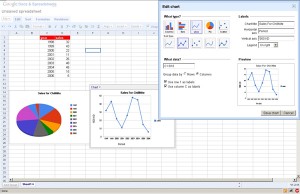
Mij valt het op dat steeds meer mensen managen by Excel sheet. Dus puur naar de nummertjes kijken. Einstein zei daarover:
“Not everything that can be counted counts and not everything that counts can be counted.”
Ook ik merk het bij mezelf dat ik enorm gefascineerd wordt door getallen en de verandering erin. Ik heb mijn eigen kasboek en controleer waar ik mijn geld aan uitgeef. Ik meet mijn hartslag in de sportschool en probeer zo tot de ideale training te komen. Ook wil ik voortgang zien als ik aan de gewichten hang. Ik denk dat ik nog wel een aantal voorbeelden kan vinden m.b.t. het meten en analyseren van getallen.
Op dit moment worden bedrijven gemanaged op de financiële cijfers. Is er genoeg omzet is er genoeg winst en zijn onze kosten niet te hoog. Deze vragen zijn natuurlijk belangrijk voor bedrijven. Zeker op de korte termijn. Andere zaken die belangrijk zijn, zijn vaak vager en moeilijker te meten. Zo is er medewerkertevredenheid, aandacht voor milieu en samenleving. Ondertussen is het wel gemeengoed geworden om deze aspecten ook te noemen in de jaarverslagen, maar de vraag blijft of er echt gemanaged wordt op deze waarden.
Sinds jaar en dag wordt de status van landen in de wereld gemeten in de vorm van het bruto binnenlands product (Gross Domestic Product of GDP in het Engels). Ook is de groei van dit product heel belangrijk. Want de algemene opinie lijkt te zijn dat welvaart 1 op 1 gekoppeld is aan het BBP. Maar zoals Robert Kennedy al meer dan 40 jaar geleden zei:
“If we believe that we, as Americans, are bound together by a common concern for each other, then an urgent national priority is upon us. We must begin to end the disgrace of this other America. And this is one of the great tasks of leadership for us, as individuals and citizens this year. But even if we act to erase material poverty, there is another greater task; it is to confront the poverty of satisfaction – purpose and dignity – that afflicts us all. Too much and for too long, we seemed to have surrendered personal excellence and community values in the mere accumulation of material things. Our Gross National Product, now, is over $800 billion dollars a year, but that Gross National Product – if we judge the United States of America by that – that Gross National Product counts air pollution and cigarette advertising, and ambulances to clear our highways of carnage. It counts special locks for our doors and the jails for the people who break them. It counts the destruction of the redwood and the loss of our natural wonder in chaotic sprawl. It counts napalm and counts nuclear warheads and armored cars for the police to fight the riots in our cities. It counts Whitman’s rifle and Speck’s knife, and the television programs which glorify violence in order to sell toys to our children.
Yet the gross national product does not allow for the health of our children, the quality of their education or the joy of their play. It does not include the beauty of our poetry or the strength of our marriages, the intelligence of our public debate or the integrity of our public officials. It measures neither our wit nor our courage, neither our wisdom nor our learning, neither our compassion nor our devotion to our country, it measures everything in short, except that which makes life worthwhile. And it can tell us everything about America except why we are proud that we are Americans.”
Naar mijn mening zullen we nooit zonder een meetinstrument kunnen. Dan moeten we de meetinstrumenten maar aanpassen zodat ook de dingen gemeten worden die nu niet in het BBP zitten. De overheid van het bergstaatje Bhutan baseert zijn beslissingen op grond van het bruto nationaal geluk (Gross Domestic Happiness of GDH in Engels). Deze laatste maatstaf begint steeds meer weerklank te krijgen in de internationale politiek. Althans het begint ook een factor te worden die meeweegt in beslissingen. Sarkozy in Frankrijk gebruikt het en David Cameron in Groot-Brittannië vindt het BBP alleen niet voldoende.
Hetzelfde geldt natuurlijk voor bedrijven. Ook daar moet niet alleen naar de financiële cijfers gekeken worden. Op het moment dat de medewerkers meer tevreden zijn dan stijgen de prestaties van een bedrijf ook. Een voorbeeld hiervan is Jumbo. Bij Jumbo gaat medewerkertevredenheid, klanttevredenheid en financiële waarde hand in hand.
Ook in het persoonlijke leven moet er verder gekeken worden dan alleen je inkomen. Vaak wordt je succes beoordeeld op je het huis dat je hebt, de auto is een goede tweede. Maar het succes van je leven zit ook in andere en soms de kleine dingen. Het meest schaarse goed in deze wereld is de tijd die je hebt. Besteed deze tijd dus zo goed mogelijk. Managen met een Excel sheet haatte ik, tenminste dat heb ik een aantal weken geleden gezegd. Maar ik denk dat op zich het managen per spreadsheet niet het probleem is, maar wel de getallen die in die spreadsheet staan.
One response to “Meten is weten, maar wat moeten we meten”
Weet je waar ik een hekel aan heb? Aan mensen die de term Excel-sheet gebruiken. 😉
Zonder dollen, goed stuk. Probleem van managen met spreadsheets wordt mijns inziens goed gekarakteriseerd in onderstaande quote van David Simon (producent van The Wire, briljante TV-serie waarin het ook veel draait om “de cijfertjes”).
“You show me anything that depicts institutional progress in America, school test scores, crime stats, arrest reports, arrest stats, anything that a politician can run on, anything that somebody can get a promotion on. And as soon as you invent that statistical category, 50 people in that institution will be at work trying to figure out a way to make it look as if progress is actually occurring when actually no progress is.” – David Simon